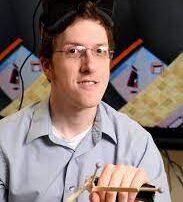XR Access Research Network
The XR Access Research Network fosters a diverse community of researchers pursuing academic-style research across fields and disciplines which have a shared interest in making XR technologies accessible, enabling innovative research, new collaborations, resource-sharing, and translational impact.
Join the research network for updates on current research, funding opportunities, research recruitment, and more!
The XR Access Research Network aims to foster academic-style research across fields and disciplines, with a shared interest in making XR technologies accessible, enabling innovative research, new collaborations, resource-sharing, and translational impact.
The Research Network holds regular seminars and conversations, supports emerging researchers at the undergraduate and graduate levels, creates networking and collaboration opportunities among research groups and between academia and industry. We also bridge the gap between researchers and disabled communities.
If you’d like to participate in the Research Network, we’d love to hear from you! You can join as an individual researcher via our application form. If you have any questions, feel free to contact us via email at info@xraccess.org.
If you’d prefer to participate in research directly, we’re always looking for research participants, especially those with disabilities and/or XR experience.
Past Seminars
All are welcome to register for the XR Access Research Network’s Seminar Series. Stay tuned for an announcement of the next seminar.


